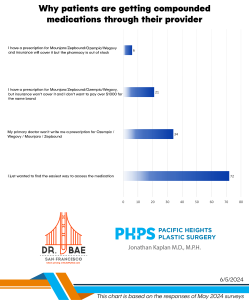
I had an interesting experience recently from two Yelp reviewers. One person gave me a one-star review because she got a bruise after Botox/Xeomin injection to reduce wrinkles in the forehead. Another left a one-star review because she was unhappy with her breast lift to correct very saggy (ptotic) breasts after massive weight loss.
Obviously if I’m using these examples, then I believe they were unfair complaints. In the first example, a bruise is a very normal potential outcome after an injection. Luckily, they’re temporary. And in the second example, the patient’s results were so amazing we would have posted a before and after photo online if she would have allowed. Clearly there were other issues at play in the second example. Some issues can’t be fixed with cosmetic surgery and I should have identified those issues preop. So that’s on me. But to be clear, we make patients happy every day and within the Yelp realm, we still have 4.5 stars out of 5 from over 50 patient reviews.
So what’s my point? It’s not simply that the customer is not always right. These two reviewers actually revealed an interesting thought process, in statistical and psychological terms, known as a confirmation bias.
The customer is not always right!
So let’s talk about confirmation bias. According to Wikipedia, confirmation bias is “the tendency to search for, interpret, favor, and recall information in a way that confirms one’s preexisting beliefs or hypotheses.” Often, when we’re on Facebook and reading controversial articles, we end up in an echo chamber. Hearing the same arguments that reaffirm our own pre-existing beliefs. This confirms our own feelings, blocking out all other dissenting opinions.
In the case of the Yelp reviewers they both said the same, but opposite, thing. I know that sounds like an oxymoron but hear me out. The patient receiving non-surgical treatment (Botox/Xeomin injections to the face resulting in a bruise), stated that I should stick with only surgical treatments since she noticed all of the glowing 5-star Yelp reviews were from my surgical patients. And the surgical patient that had the breast lift noticed that all of my 5-star reviews were from patients receiving non-surgical treatments!
In their mind, they only noticed the 5-star reviews from patients receiving the opposite treatment they received (surgical reviews in the case of the non-surgical patient, non-surgical reviews in the case of the surgical patient). But if anyone takes a critical look at all of my reviews, they would very quickly see they’re evenly distributed between surgical and non-surgical reviews. In fact, the surgical patient that said I only had 5-star reviews from non-surgical patients obviously didn’t recognize that the very FIRST review on the page (which was 5 stars) was from a surgical patient! Again, adding up to a cumulative 4.5 stars out of 5.
So based on their confirmation bias, they only saw reviews that reaffirmed what they already believed. That I’m good at the procedures they didn’t receive! If the non-surgical patient believes I’m good at cosmetic surgery and the surgical patient thinks I’m good at non-surgical services, what are we to believe? Taking their two reviews together, I’m either good at both cosmetic surgery and medicine…or bad at both! Needless to say, the customer is not always right.
Click here for the original blog post written by Dr. Kaplan for BuildMyBod.




